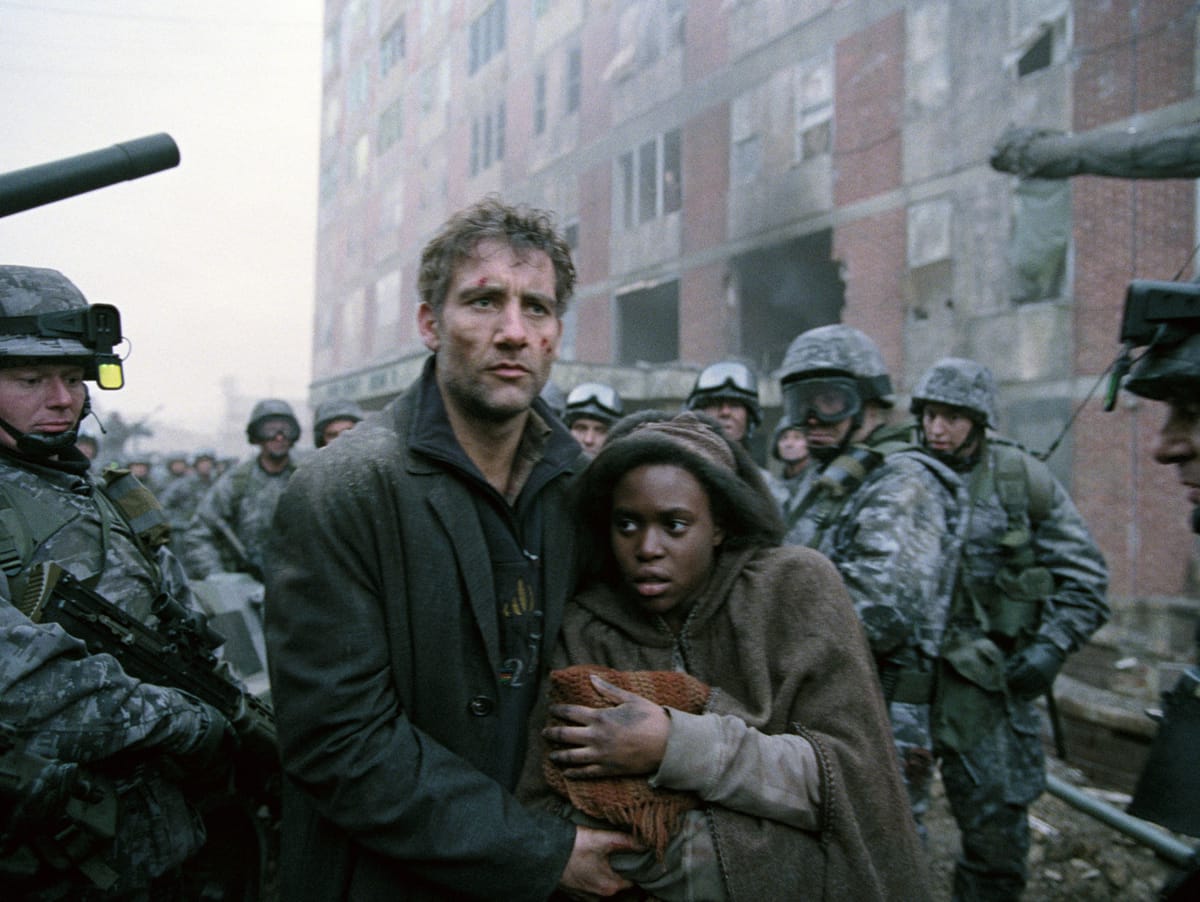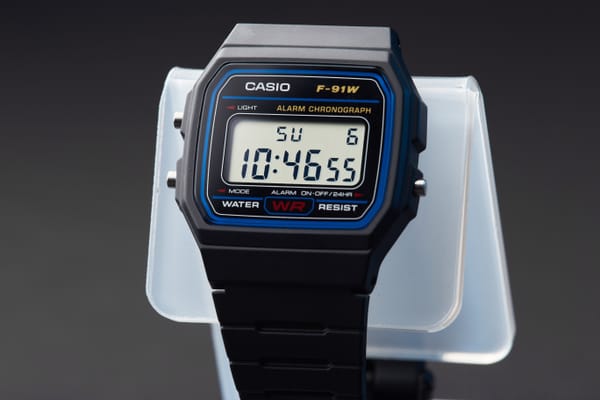A Movie Review Of Alfonso Cuarón's Children Of Men
Due to its poor marketing, you'd be forgiven for dismissing Children of Men upon its initial release in 2006, but don't pass it up now. It is an incredible film that has stood the test of time. Not just for it's captivating story, but for its relevant social commentary.

Decaf Journal is reader-supported. When you buy links through our site, we may earn an affiliate commission.
Despite receiving widespread critical acclaim, the science fiction drama Children of Men was a commercial failure upon its initial release in 2006, and didn't even break even on its $76 million budget. Loosely based on the 1992 novel by P. D. James, I first saw the film in theatres on opening weekend during my senior year of high school, and while it left a lasting impression back then, it certainly makes an impact now. Roughly 20 years later, somehow Children of Men now feels closer to our current reality than it doesn't. The world was a very different place back then, yet the film feels more relevant today. Even though it's a dystopian fantasy, it is in some ways shocking at how accurately the film predicted the future. Which begs the question, how did Children of Men get it so right?
Artists
- Director: Alfonso Cuarón
- Cinematographer: Emmanuel Lubezki
Technical Specifications
- Cameras: Arricam LT, Arriflex 235
- Lenses: Zeiss Master Prime Lenses
- Film Stocks: Kodak Vision2 Expression 500T, 5229
Children of Men opens with present day being the year 2027. The film takes place in London, and British borders are closed to foreigners. The government has a sharp focus on the systematic deportation of illegal immigrants, hunting them down, and even labelling them as terrorists. Government propaganda against illegal immigrants plays continuously on television and public transit to remind the general public of the enemy, and to report any suspicious behaviour. Illegal immigrants are caged like animals, brutally beaten by police, rounded up, and put on buses headed to refugee camps which turn out to have more in common with concentration camps. People frequently die there at the hands of the police with no oversight.
Acts of terrorism are frequent, yet some say it's the government performing false flag operations in order to keep the public afraid and under control. Activist organizations are becoming increasingly assertive and use violence as a means to an end. Earthquakes, pollution, disease, and famine are all commonplace as cities around the world fall apart. However, the most serious issue is that the entire human race now suffers from infertility, and the world has lost hope as a result. The youngest person on the planet, 18 year old Diego Ricardo is stabbed to death after refusing to sign an autograph. People everywhere are grieving baby Diego's death, as he was a tragic reminder of humanity's 18 years of infertility.
Theo Faron (played by Clive Owen) lost his young son to an illness, and it's clear that he carries it with him like a visible disfiguring scar. He comes off as arrogant and pessimistic but it might be to simply hide the pain that he's enduring. He carries a mickey of hard alcohol with him in his jacket pocket at all times to cope with the hardest moments in life. The only person who ever seems to be able to lift his mood is Jasper Palmer (played by Michael Caine). Jasper is a hilarious John Lennon-esque lighthearted delight who acts as a counterweight to the depressing reality of the world. Not interested in helping the greater good, Theo doesn't want to be involved in any cause or movement, but that's exactly what he gets pulled into by his activist ex-wife Julian (played by Julianne Moore).
While providing few details, she asks Theo for help in transporting a young woman named Kee (played by Clare-Hope Ashitey) to the coast in order to reach a boat called the Tomorrow. This boat will take her to The Human Project, which is a shadow organization working to cure human infertility. Little is known about The Human Project or whether it even really exists, and Theo scoffs upon hearing of their involvement. After he reluctantly agrees, along the way Kee reveals to Theo that she is miraculously pregnant. It's the miracle that the whole world has been waiting for, and it is in that moment that Theo realizes what's at stake.
In terms of visuals, Children of Men is gritty in all of it's 35mm analog glory. The film showcases muted tones to emphasize the cold nature of the world, with a strong emphasis on cyan shadows and a lovely halation of highlights. The cinematography style is best described as stylized reality, in that it has a realistic texture with regards to the messiness of life, but is polished just enough to be subtle eye candy. Lighting is aesthetically pleasing, with a well balanced mixture of real world practical light sources for wider scenes and attractive key light for closeups, but there's never an unnecessary light source purely for show. Rather, every light is motivated by the real world.
The brilliance of the filmmaking here is that unlike today's blockbusters there are very few quick cuts. Director of Photography, Emmanuel Lubezki instead opts for longer dramatic scenes which are choreographed to such an extent that it looks convincingly like reality. The camera itself is mostly shot handheld, which adds to the realism and immerses the viewer further into the story. Because of this, every scene feels real, almost like a first person documentary perspective. The ingenious combination of lenses, long takes, and carefully chosen camera angles effectively captures the brutality of real life. Tranquil scenes are used in contrast as well to reinforce an authentic world.
It would be a missed opportunity to discuss Children of Men without addressing perhaps the most incredible happy accident in recent cinema history, which occurs during a 379-second-long single continuous shot where blood unintentionally splatters on the camera lens and ends up creating an unforgettable scene. In director Alfonso Cuarón's own words:
We had 12 days to do the car attack scene. 10 days into it, we they were still staging it. After 12 days, we were going to lose the location. Day 11 came and there were accidents, and we could only do 2 takes a day. On the last day, we knew we were losing location next day. In the morning it was great, but an operator fell down so we only had only one more shot. We were shooting the last take, everything goes great, but then by accident the blood spills onto the lens. I yelled cut, but there was an explosion and nobody heard me so they kept shooting. Then, later, I realized that the blood splash was the miracle [in that scene].
A compelling story and beautiful visuals aside, the most striking thing about viewing Children of Men in retrospect is how it so accurately predicted what was to become our present real world modern life. The film makes mention of:
- A great flu pandemic that robs Theo of his son years prior.
- Government mass surveillance and asserting control of its citizens through mandates resulting in a loss of personal freedoms. "Hold out your ID cards and follow instructions" are routinely broadcast over loudspeakers.
- Quietus is the government promoted suicide kit which is widely featured on TV, buses, billboards, etc. This bears an eery resemblance to Canada's medical assistance in dying program, which has even begun advising patients who aren't physically ill to end their lives.
- Homeless tents and fires seem to be permitted everywhere on the streets, and garbage is littered everywhere. People are clearly desperate and without hope everywhere you look.
- Immigration and environmental issues are occurring on a massive scale.
- There's a clever scene where a young Ed Westwick is sitting at the dinner table, completely hypnotized by his device (an ipad / apple watch style wearable hybrid), and his father repeatedly asks him to take his pills, likely to keep him controlled and compliant. He doesn't even notice until his father resorts to screaming at him to do as he's been told.
This all seemed somewhat far fetched in 2006, but in many western cities today this has become a common sight. It is a stark reminder of where our world is headed, and sadly we are still going further down this road.
In an interview from 2018, Alfonso Cuarón had this to say about the film's strikingly accurate portrayal of the future we now live in:
But when we were doing the film, it was more trying to understand—and all these articles were talking about the prophetic aspect. Of how I was a prophet. And I was not a prophet. The thing is I was talking with people that were not prophets, they were people that were just actually…aware of what was going on. While the media, liberal media has taken us into a beautiful narrative of progress, there were other people that were very concerned about all of these different tendencies that were happening all around the world. And it was like seven years of reading and of talking with some of these great people. And trying to create… I wouldn’t tell that to the studio usually, but we wanted to do an essay more than making a film. We never set off to do a science fiction film.
Children of Men is a well written motion picture with excellent character development that thankfully doesn't end up stagnating the narrative. You will quickly care about everyone on screen, and oftentimes it feels traumatic to watch the story unfold as the film juxtaposes candid slice of life moments with the worst of humanity. Theo and Kee are forced to operate on faith alone for deliverance, at the risk of losing everyone and everything that they care about when tasked with preserving the greater good.
Due to its poor marketing, you'd be forgiven for dismissing Children of Men upon its initial release in 2006, but don't pass it up now. It is an incredible film that has stood the test of time. Not just for it's captivating story, but for its relevant social commentary. You will leave the film affected by what you've seen. It's memorable to the point where you'll be thinking about it for days afterwards, especially since we are dangerously close to living in that same world today.
One of the most unforgettable lines of dialogue in the movie leaves us with a sobering thought to contemplate:
Very odd, what happens in the world without children's voices.
If the world isn't reminded of innocence, we will inevitably destroy ourselves and each other.





